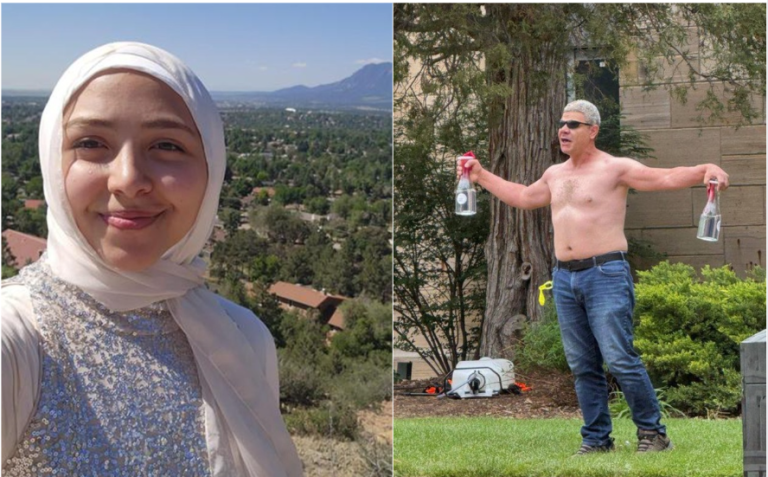Habiba Mohamed Sabry Farag Soliman came to the United States with a strong sense of purpose and determination. As a scholarship student, future doctor, and high school graduate hailed by Denver educators, she represented possibilities for young immigrants. However, in a startlingly quick turn of events, her future is now extremely uncertain. In addition to upending his own life, her father’s alleged antisemitic attack in Colorado may have been even more tragic because it put her dreams in jeopardy.
Habiba was born in Egypt, but she was raised primarily in Kuwait. When her family arrived in the US in 2022, they took a calculated risk by applying for asylum on her father Mohamed Soliman’s behalf. In search of stability, the seven-member family—which included Habiba’s mother and four siblings—arrived in Denver. Habiba was especially motivated; she attended Thomas Maclaren School and was named a “Best and Brightest” honoree in the Denver Gazette, which is a recognition awarded to exceptional seniors who are graduating.
| Attribute | Details |
|---|---|
| Full Name | Habiba Mohamed Sabry Farag Soliman |
| Date of Birth | 2006 (Approximate, based on age 18 in 2024) |
| Nationality | Egyptian |
| Residence (Before Detention) | Denver, Colorado, USA |
| Immigration Status | Under ICE detention, pending expedited removal |
| Educational Background | Graduate of Thomas Maclaren School, Colorado |
| Academic Achievements | Recipient of “Best and Brightest” scholarship (Denver Gazette profile) |
| Career Aspiration | Pursuing a career in medicine |
| Family Relationship | Daughter of Mohamed Sabry Soliman (accused in antisemitic hate crime) |
| Public Situation | In ICE custody with mother and four siblings, facing deportation |
| Relevant Legal Case | Family’s deportation halted by US District Judge Gordon Gallagher |
| Reference Link |
Her passion for medicine was very intimate. She made the decision to pursue a medical degree and make healing her life’s work after seeing her father recover from surgery that restored his ability to walk. Her high school experience was characterized by that sense of purpose. Habiba claimed that her arrival in America had “fundamentally changed” her, not only in her perspective but also in her capacity for adaptation, fortitude, and a commitment to family values in the face of significant change.
However, on June 1st, that encouraging trajectory was suddenly interrupted. In a disturbing act that injured twelve people, Mohamed Soliman was arrested for allegedly throwing two Molotov cocktails into a pro-Israel demonstration in Boulder while yelling, “Free Palestine.” Investigators claim he admitted to having planned the attack for more than a year and waiting until Habiba graduated before executing it.
Agents from the federal government moved swiftly. The entire Soliman family was taken into custody by Immigration and Customs Enforcement (ICE) within 48 hours of his arrest. Habiba and her family were placed under arrest while a federal investigation into whether they knew about Soliman’s attack was underway. They were stripped of their visas and prepared for expedited deportation.
A heated legal and public discussion was sparked by this development. Biden appointee US District Judge Gordon Gallagher stepped in to prevent the family’s immediate deportation, arguing that their deportation without due process might cause “irreparable harm.” The young woman, whose only offense may be that she shares a last name with a man now accused of 16 counts of attempted first-degree murder and federal hate crimes, has a brief reprieve and a glimmer of hope as a hearing is now scheduled for June 13.
The ramifications are extremely disturbing. The way the Department of Homeland Security has handled the families of people involved in high-profile legal incidents has come under more scrutiny in recent years. The agency has rekindled concerns about collective punishment and due process under immigration law by holding an 18-year-old aspiring doctor without solid proof of misconduct.
The offspring of people who are suspected of terrorism have previously been targeted by public policy. Examples such as the family of the Tsarnaev brothers and, more recently, the relatives of suspects in attacks in Europe show how easily a person’s closeness to the accused can overshadow a record of integrity and accomplishment. Habiba’s academic discipline, scholarship, and clear vision for a life of service are now eclipsed by connections she might not have foreseen.
However, analysts point out that the Soliman case might mark a shift in how the US approaches these kinds of legal ambiguities. The case is receiving national attention due to the participation of well-known legal professionals and its prominence, especially among Muslim-American communities and human rights organizations. Civil liberties organizations have voiced their disapproval of what they consider to be “preemptive punishment,” especially when it comes to minors or suspects’ dependents.
The wider ramifications touch on issues of security, immigration, and education. Should deportation decisions be influenced by moral character and academic achievement? In the absence of specific proof of involvement, should family members be looked into based only on association? These are difficult questions, but they are becoming more pressing in a nation that is still struggling to strike a balance between individual rights and national security.
Habiba waits for the time being, uncertain but not defeated. Her school friends have started to speak up for her. Once praising her intelligence and commitment, her teachers have now written letters to elected officials, promoting her cause in public. Their efforts show concern for the moral example being set in addition to love for a bright student.
Interestingly, this situation is taking place as tensions over pro-Israeli and pro-Palestinian sentiment in the United States are on the rise. Universities and other public institutions have been the focal points of these discussions in recent months, sometimes turning violent or leading to legal escalation. Habiba has unintentionally become a symbol of these complexities because she is torn between political repercussions and family loyalty.
By drawing national attention to a single student, the Soliman case forces us to consider what justice means for suspect families not only in court but also in communities and classrooms. Habiba’s deportation would send a terrifying message if she was found not to have been involved in the attack: that guilt can be passed down through circumstances and that dreams can be dashed just as they are about to blossom.
We don’t know what the future holds for her. The story of Mohamed Soliman’s daughter, however, has already fundamentally changed our understanding of justice, responsibility, and the price of affiliation in this era of suspicion and surveillance.




